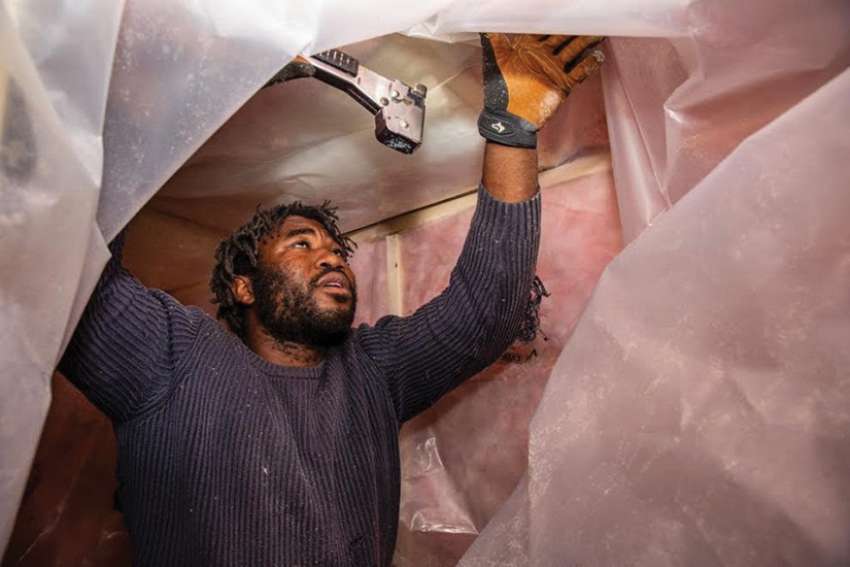Toronto Tiny Shelters, an organization fronted by Khaleel Seivwright, a carpenter from Scarborough, Ont., has been constructing shelters since last September to help those without a place to go. But the project has run into opposition from the City of Toronto, which has applied for an injunction with the Ontario Superior Court to forbid placing such structures on city property. It has cited “serious safety concerns,” including fires and lack of access to water and sanitation, as well as bylaws that prohibit camping on city property.
In these pandemic times, outbreaks at shelters have compelled many homeless to shun community-based housing in favour of tents or makeshift shelters constructed in city parks — a dangerous and unhealthy situation which Seivwright’s shelters aim to solve.
Faith groups have stepped up to support Toronto Tiny Shelters’ fight on behalf of the homeless. Faith Connections — a young adult ministry operating under the Sisters of St. Joseph of Toronto — is a fervent supporter. It has signed an ecumenical petition created in response to the injunction. Representatives from over 52 churches have signed the document.
Sabrina Chiefari, the interim program director for Faith Connections, says “in the spirit of Christian neighbourly love, it made sense to join the voices of these other Christian organizations and spread the petition,” adding that “it just felt right to represent the voice of young adults.”
The question, according to Chiefari, is “how can we address the current immediate urgent need, without forgetting the long-term changes that are required?”
The Sisters of St. Joseph are no strangers to initiatives of this nature. Through Fontbonne Ministries they run the Mustard Seed Program which provides homeless persons with a hot meal, clean clothes and, most importantly, acceptance. Chiefari describes it as “a community space where they don’t feel shunned or that they have to be pushed out.”
The 28-year-old Seivwright — who was unavailable for an interview with The Catholic Register — mentioned in a February video statement that the city’s actions are a “distraction” and the “problem is not the tiny shelters, but the fact Toronto’s most vulnerable people are falling through the cracks.”
Many have called the city’s use of resources into question, especially as the time and money spent on legal processes grows. Seivwright has almost $275,000 in donations from a GoFundMe campaign as of May 10. Originally intended to be used for building materials, a portion of the donations are now going towards legal fees.
Danny Kastner of Kastner Lam LLP is representing Seivwright. He said the construction of shelters is still a top priority for Seivwright and that lawyers “are working at significantly reduced rates in order to ensure that the maximum amount of donations will go to” construction.
Seivwright’s cause has drawn plenty of support.
“It doesn’t take somebody who’s Catholic or Christian to look at the situation of somebody providing shelter for those that are unhoused during this incredible time,” said Chiefari, who calls the actions taken by the city “ludicrous.”
She also points out that this particular legal issue highlights problems with the city’s management of its homeless population.
“We don’t want to be forever a city where it’s commonplace that people stay overnight on the ground because that’s the safest place for them.”
(Stocking, 18, is a Grade 12 student at Michael Power-St. Joseph High School in Etobicoke, Ont.)


